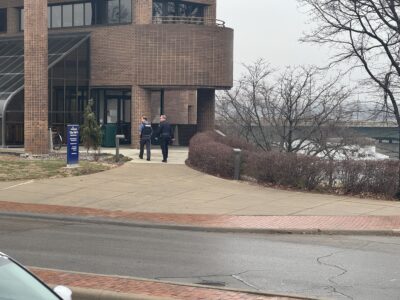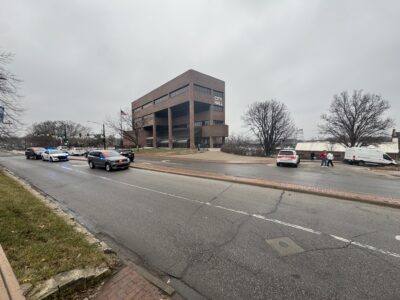FAA alleges city, airport operator have violated provisions of federal grants; future grant dollars could be halted
Among the issues are whether airport operator can charge pilots to park aircraft

photo by: Submitted photo/Lloyd Hetrick
Lawrence Municipal Airport is pictured in this aerial photo from summer 2019.
UPDATED: 7:25 P.M. JUNE 18
Federal officials are warning that Lawrence’s airport is at risk of losing access to all federal grants, which would end a multimillion-dollar funding stream used by the city to maintain and expand the airport.
City officials received a formal notice in April that a more than year-long investigation by the Federal Aviation Administration has preliminarily determined the city and its private partner that operates the Lawrence Regional Airport are out of compliance with key provisions of past FAA grants.
Unless the city quickly corrects the violations, the airport would no longer be eligible for future FAA grants, and a more than $1 million grant the city had expected to receive for facility repairs has been put on hold. City officials recently replied to FAA officials that the city will work to correct the violations, but it is unclear whether the city’s private partner, Hetrick Air Services, is willing to make the requested changes.
An attorney for Hetrick, however, said the company is following FAA regulations, and that the city has played a role in creating a misunderstanding with the FAA by not providing the federal regulators with all the relevant agreements Hetrick has with the city and by misstating others.
Among the issues in question is one that nearly all visiting pilots face upon every landing at the Lawrence Regional Airport — how much they must pay to park their aircraft on the airport’s apron.
The FAA has determined that pilots can’t be charged anything to park or “tie down” their aircraft on the apron because the apron project was funded with FAA grant monies, and maintaining broad access to the aviation public was a requirement of the grant.
However, Hetrick Air Services has been charging for such parking. The website for Hetrick lists fees ranging from $75 to $200, depending on the size of the aircraft. The city in early May asked Hetrick to immediately stop charging for aircraft parking, but a city official told the Journal-World this week that Hetrick seemingly has not changed its practices.
“To our knowledge, tie-down fees may still be in place,” Melissa Sieben, the city’s director of municipal services and operations, said in an email to the Journal-World. “The city has not received any communication to suggest that these charges have been removed.”

photo by: Chad Lawhorn/Journal-World photo
Aircraft took up a large part of the main apron at Lawrence Municipal Airport on Sept. 23, 2021 as Lawrence was stop on the Kansas Air Tour.
However, in a May 27 letter to the city, an attorney for HAS argues that Hetrick years ago signed an agreement with the city that stipulates a portion of the airport’s apron will be made available to any visiting aircraft operator that does not want to pay a fee and does not want any services from the airport. However, the agreement also makes clear that Hetrick can offer services to operators who park their aircraft. That can include towing services, securing the aircraft and other similar activities.
“This is exactly what Hetrick has been doing,” attorney Margaret Martin told the city in the letter.
Martin argues the FAA would have no objections to those operations, but when the city responded to the FAA complaint it used language that gave an impression that HAS was leasing and controlling the apron itself, which the FAA generally does not allow. HAS, in the letter, offered to amend its agreement with the city to use language that more clearly articulates the services, and also would change public signage at the airport to clearly state there is a free parking area available.
In its response to the Journal-World, the city made no mention of HAS’ position on the parking matter. The city acknowledged it had received a response from HAS, but declined to provide the document to the Journal-World, saying it was waiting for an opinion from the city attorney on whether the document could be shared. Representatives with HAS, ultimately provided the letter to the Journal-World Wednesday evening.
It is not clear what the city’s next move may be to satisfy the FAA. In her response to the Journal-World, Sieben indicated that more action on the part of the city was forthcoming, but provided no specifics.
“We want to operate the Lawrence Regional Airport in a manner consistent with our values as a community,” Sieben said. “Our goal is to make the airport the best it can be, and that will require some change.”
The parking issue wasn’t the only one raised by the FAA. The federal officials also allege the way the city and Hetrick are managing leases at the city-owned airport is a violation of FAA grant regulations.
In one instance, the FAA alleged violations occurred when Hetrick granted a sublease for use of an airport hanger to another aviation company without first receiving the city’s permission to grant the sublease. When the FAA investigated the matter, it asked for a copy of the sublease, but was unable to obtain a copy, as neither the city nor the aviation company renting the space had one. The FAA alleged that also was a violation of FAA standards.
Hetrick’s attorney has responded that the city has incorrectly stated there was ever a sublease with the company, Eurotec Vertical Flight Solutions. Rather, negotiations to create a sublease with Eurotec were unsuccessful, and the tenant has been allowed to stay on a month-to-month basis while an eviction matter is making its way through the court system. Chad Decker, an owner of Eurotec, did not return phone calls seeking comment.
In another instance, the FAA alleged that the city has impermissibly allowed Hetrick Air Services to have a de facto right of first refusal for 50,000 square feet of vacant land on the southeast side of the airport property. In 2022, the city granted Hetrick a lease for that property, as there was an interest in building a private hangar on the site. However, the lease was structured in a way that Hetrick was not required to make any lease payments unless and until the hangar was built and occupied, which has not occurred.
The FAA alleges that agreement is effectively shutting out other potential aviation companies — like Eurotec — from using the airport for their operations, given the limited amount of land available at the airport. The FAA said the city should grant leases only to parties that can put the land to use in the near future. In her letter, Hetrick’s attorney argues HAS is not only willing to develop the property in question, but is “eager to do so.” The attorney said the company is willing to modify the lease agreement to set a firm date for development and rent payments to begin.

photo by: Chad Lawhorn/Journal-World photo
Operations for Eurotek Vertical Flight Solutions are shown at the Lawrence Municipal Airport in this October 2021 photo.
The issue of how much control a single entity like Hetrick Air Services should have over the airport property is another matter hanging over the FAA complaint. That issue also is being contested in Douglas County District Court, as well. Hetrick is involved in a lawsuit with Eurotec Vertical Flight Solutions — the helicopter company that has the sublease for the hangar building in question.
Among the issues in that case is whether Hetrick can evict Eurotec from the hangar without the city’s blessing. The city has asked Hetrick to not evict Eurotec from the building, as the city has touted the company as an example of positive economic development at the airport.
Eurotec alleges Hetrick is seeking to evict Eurotec over fears that Eurotec may become a competitor for some airport services — such as fuel sales — that historically have been offered only by Hetrick.
That lawsuit is scheduled to go to trial later this month. The findings by the FAA are a separate matter, but Eurotec has acknowledged that it is the entity that filed the complaint with the FAA, which sparked the investigation by the federal agency.
Hetrick Air Services is a Lawrence-based company. For many years it was owned by local businessman Lloyd Hetrick, who provided day-to-day operations at the airport. However, a group of local and regional investors led by Lawrence businessman Doug Compton bought Hetrick Air Services in recent years to start a charter aircraft service and to expand other services at the airport.
As for the future of potential grants to the Lawrence Regional Airport, Sieben said there is concern on the city’s part that the FAA’s findings could make the airport ineligible for future grants, if the issues aren’t corrected promptly.
“FAA grant funding has been essential to maintaining and improving the Lawrence Regional Airport,” Sieben said via email. “Their support enables the city to complete vital infrastructure projects — such as runway, taxiway, and apron replacements — with limited use of local funds.”
The Lawrence airport has received a variety of FAA funds over the years. It currently is expecting $1.1 million of FAA funding for an apron repair project, but that grant has been placed on hold as a result of the FAA allegations. In 2022 the airport received more than $1 million in FAA modernization funds to make improvements at the Lawrence terminal building. Since 1982, the city has received more than $20 million in FAA grants for various projects at the airport, according to documents from the city.






